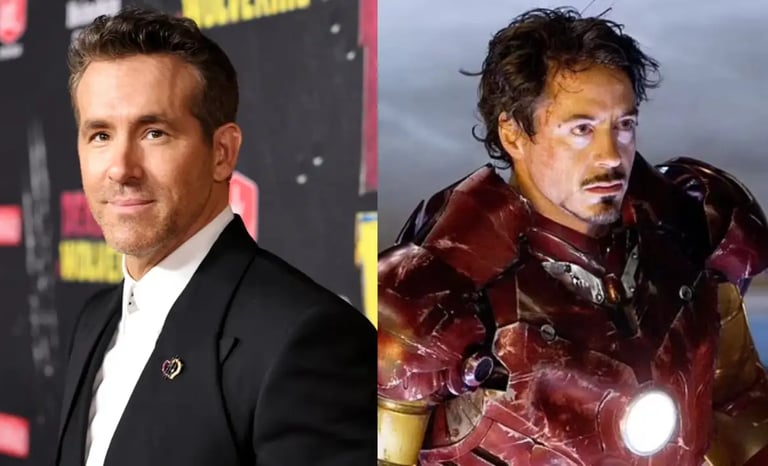Robert Downey Jr.–Ryan Reynolds Feud? Fans Speculate After ‘Avengers: Doomsday’ Set Rumours
ENTERTAINMENT


Reports hint at an alleged fallout between Robert Downey Jr. and Ryan Reynolds on the Avengers: Doomsday set.
Avengers: Doomsday Rumors – What They Reveal About Fan Culture and the MCU
When it comes to the Marvel Cinematic Universe (MCU), speculation has become just as much a part of the experience as the films themselves. From wild fan theories to alleged behind-the-scenes drama, every piece of news — confirmed or not — spreads rapidly across the internet. Recently, whispers surrounding Avengers: Doomsday suggested tension among its leading stars. Whether grounded in fact or fueled purely by fandom imagination, such rumors tell us more about the culture surrounding superhero films than about the films themselves.
Why Marvel Rumors Spread Like Wildfire
The MCU isn’t just a film franchise — it’s an interconnected cultural phenomenon with millions of invested fans worldwide. The stakes are high: every casting decision, story leak, or production delay carries global implications.
Rumours spread quickly for three main reasons:
Emotional Investment – Fans are deeply attached to their favorite heroes and actors. Any suggestion of discord threatens the image of unity that Marvel carefully cultivates.
Digital Virality – With social media platforms amplifying every small whisper, speculation snowballs faster than official statements can address them.
Hollywood Secrecy – Marvel Studios is notoriously secretive. In the absence of transparency, fans fill in the blanks with theories, leaks, or alleged “insider scoops.”
In the case of Avengers: Doomsday, a single comment from a podcaster sparked debates, trending hashtags, and countless YouTube breakdowns. It’s not surprising — the combination of beloved actors, high-budget productions, and global stakes makes Marvel the perfect breeding ground for viral speculation.
The History of MCU Star-Related Rumours
This isn’t the first time rumours about Marvel actors have gone mainstream. In fact, it’s practically a tradition at this point. Over the years, the MCU has seen:
Robert Downey Jr. Exit Talk – Long before Avengers: Endgame, speculation swirled about when Iron Man would retire, with tabloids suggesting contract disputes.
Spider-Man Casting Chaos – Every time Sony and Marvel renegotiate their deal, rumours about Tom Holland’s future as Spider-Man ignite fan panic.
Creative “Clashes” – Several directors, from Edgar Wright (Ant-Man) to Scott Derrickson (Doctor Strange 2), have parted ways with Marvel over “creative differences.”
Most of these situations were resolved without lasting damage to the franchise. If anything, the buzz surrounding them only heightened audience interest in the films that followed.
How Rumours Shape the MCU Hype Cycle
For studios, rumours are a double-edged sword. On one hand, they risk undermining trust in the production and its cast. On the other hand, they generate free publicity.
Take Avengers: Doomsday as an example. Even if the alleged clash never happened, the conversation around it amplifies anticipation. Fans will head into theatres not only to see the story unfold but also to observe the chemistry among the stars, consciously or not.
This is part of the MCU’s unique marketing ecosystem:
Official trailers set the stage.
Leaks and speculation fuel online discussions.
Rumours — whether of cameos, plot twists, or actor disputes — keep the brand at the top of trending charts.
Marvel may not encourage these rumours, but it certainly benefits from the nonstop attention.
The Impact on Actors and the Industry
Behind the glitz, rumours can be exhausting for the stars themselves. In today’s hyper-connected world, a single speculative tweet can spark thousands of headlines. For actors, that means living under constant public scrutiny, where every word, gesture, or offhand joke may be interpreted as confirmation of a feud.
The film industry as a whole faces a challenge here: balancing secrecy with transparency. Superhero movies rely on spoilers staying hidden, yet the demand for information has never been greater. Studios walk a fine line — too much secrecy leads to uncontrolled rumours, while too much openness risks leaking critical plot details.
Fan Culture: The Real Driving Force
At its core, the frenzy around Avengers: Doomsday isn’t about actors fighting or contracts being disputed — it’s about the fans. Modern fandoms thrive on participation. Breaking down “clues,” debating theories, and even spreading rumours are ways for audiences to feel like they’re part of the storytelling process.
In this sense, the speculation itself becomes entertainment. Entire YouTube channels and podcasts dedicate themselves to covering “what ifs,” and for many fans, following rumours is just as thrilling as watching the final film.
What This Means for Avengers: Doomsday
The next Avengers instalment has enormous expectations riding on it. It must live up to the legacy of Endgame, balance an ever-growing cast, and set the stage for Marvel’s future. With so much pressure, even minor reports of tension will gain outsized attention.
But history shows that Marvel productions almost always push through challenges, and audiences rarely lose enthusiasm. If anything, the conversation around rumoured conflicts only underscores how much people care.
Final Thoughts
Whether true or not, the latest Avengers: Doomsday rumours shine a spotlight on the relationship between fans, media, and Hollywood studios. They reveal the appetite for behind-the-scenes drama, the power of online speculation, and the unique pressures of blockbuster filmmaking in the MCU era.
For Marvel fans, the lesson is clear: while it’s fun to follow the chatter, the real magic happens when the lights dim and the movie begins. Until then, speculation will continue to be part of the Marvel experience — as inevitable as the post-credit scene.
